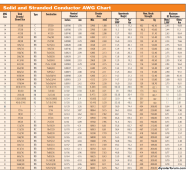JazzRVwSolar
New Member
I purchased wire marked 8AWG from a highly reputable company. After install, I notice voltage losses that were higher than I expected given that I had used 8AWG. Out of desperation, I checked the gauge of the wire which is labeled 8AWG. It is more like 11AWG. I am still battling the wire manufacture.
Now 11AWG vs 10AWG is close. When wire is sealed around insulator, it can compress the wire a bit. So, if this was reading 11AWG and I had bought 10AWG, I would have been okay. But I spent significantly extra for 8AWG and it is measuring 11AWG. I only found out after install. If you buy wire, please check AWG carefully.
In solar applications where you are producing your own power and every watt is precious (not to mention expensive purchase), you cannot afford to loose wattage due to thin wire. Think like this: take same brand panel that is 17% efficient and compare that with 21% efficient panel. That difference is the cost of an extra 3 - 4%. By buying inexpensive gauge wire, you are loosing the money you spent for the higher grade panel. If you have unlimited real estate for solar (unlike RV), you are okay. But with RV solar, not good idea.
P.S.
Here is how to measure wire gauge. Cut the shielding at some point with a cutter. Slowly pull it back to expose the copper wire. But do not remove that shielding all the way. You don't want the wire to unwind and become bushy. Then it's too hard to tell what the actual gauge is. To see if you doing it right, buy multi-strand from local hardware store and check using above procedure. You will find it works out.
Now 11AWG vs 10AWG is close. When wire is sealed around insulator, it can compress the wire a bit. So, if this was reading 11AWG and I had bought 10AWG, I would have been okay. But I spent significantly extra for 8AWG and it is measuring 11AWG. I only found out after install. If you buy wire, please check AWG carefully.
In solar applications where you are producing your own power and every watt is precious (not to mention expensive purchase), you cannot afford to loose wattage due to thin wire. Think like this: take same brand panel that is 17% efficient and compare that with 21% efficient panel. That difference is the cost of an extra 3 - 4%. By buying inexpensive gauge wire, you are loosing the money you spent for the higher grade panel. If you have unlimited real estate for solar (unlike RV), you are okay. But with RV solar, not good idea.
P.S.
Here is how to measure wire gauge. Cut the shielding at some point with a cutter. Slowly pull it back to expose the copper wire. But do not remove that shielding all the way. You don't want the wire to unwind and become bushy. Then it's too hard to tell what the actual gauge is. To see if you doing it right, buy multi-strand from local hardware store and check using above procedure. You will find it works out.
Last edited:



